#authorized domain
Text
Netflix wants to chop down your family tree
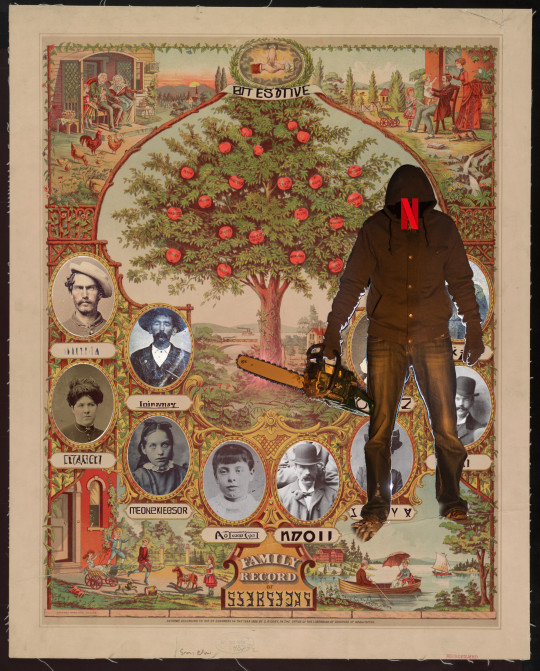
Netflix has unveiled the details of its new anti-password-sharing policy, detailing a suite of complex gymnastics that customers will be expected to undergo if their living arrangements trigger Netflix’s automated enforcement mechanisms:
https://thestreamable.com/news/confirmed-netflix-unveils-first-details-of-new-anti-password-sharing-measures
If you’d like an essay-formatted version of this post to read or share, here’s a link to it on pluralistic.net, my surveillance-free, ad-free, tracker-free blog:
https://pluralistic.net/2023/02/02/nonbinary-families/#red-envelopes
Netflix says that its new policy allows members of the same “household” to share an account. This policy comes with an assumption: that there is a commonly understood, universal meaning of “household,” and that software can determine who is and is not a member of your household.
This is a very old corporate delusion in the world of technology. In the early 2000s, I spent years trying to bring some balance to an effort at DVB, whose digital television standards are used in most of the world (but not the USA) when they rolled out CPCM, a DRM system that was supposed to limit video-sharing to a single household.
Their term of art for this was the “authorized domain”: a software-defined family unit whose borders were privately negotiated by corporate executives from media companies, broadcasters, tech and consumer electronics companies in closed-door sessions all around the world, with no public minutes or proceedings.
https://onezero.medium.com/the-internet-heist-part-iii-8561f6d5a4dc
These guys (they were nearly all guys) were proud of how much “flexibility” they’d built into their definition of “household.” For example, if you owned a houseboat, or a luxury car with seatback displays, or a summer villa in another country, the Authorized Domain would be able to figure out how to get the video onto all those screens.
But what about other kinds of families? I suggested that one of our test cases should be a family based in Manila: where the dad travels to remote provinces to do agricultural labor; the daughter is a nanny in California; and the son is doing construction work in the UAE. This suggestion was roundly rejected as an “edge case.”
Of course, this isn’t an edge case. There are orders of magnitude more people whose family looks like this than there are people whose family owns a villa in another country. Owning a houseboat or a luxury car makes you an outlier. Having an itinerant agricultural breadwinner in your family does not.
But everyone who is in the room when a cartel draws up a standard definition of what constitutes a household is almost certainly drawn from a pool that is more likely to have a summer villa than a child doing domestic work or construction labor half a world away. These weirdos, so dissimilar from the global majority, get to define the boxes that computers will shove the rest of the world into. If your family doesn’t look like their family, that’s tough: “Computer says no.”
One day at a CPCM meeting, we got to talking about the problem of “content laundering” and how the way to prevent it would be to put limits on how often someone could leave a household and join another one. No one, they argued, would ever have to change households every week.
I put my hand up and said, “What about a child whose divorced parents share custody of her? She’s absolutely going to change households every week.” They thought about it for a moment, then the rep from a giant IT company that had recently been convicted of criminal antitrust violations said, “Oh, we can solve that: we’ll give her a toll-free number to call when she gets locked out of her account.”
That was the solution they went with. If you are a child coping with the dissolution of your parents’ marriage, you will have the obligation to call up a media company every month — or more often — and explain that Mummy and Daddy don’t love each other any more, but can I please have my TV back?
I never forgot that day. I even wrote a science fiction story about it called (what else?) “Authorized Domain”:
https://craphound.com/news/2011/10/31/authorised-domain/
I think everyone understood that this was an absurd “solution,” but they had already decided that they were going to complete the seemingly straightforward business of defining a category like “household” using software, and once that train left the station, nothing was going to stop it.
This is a recurring form of techno-hubris: the idea that baseline concepts like “family” have crisp definitions and that any exceptions are outliers that would never swallow the rule. It’s such a common misstep that there’s a whole enre* called “Falsehoods Programmers Believe About ______”:
https://github.com/kdeldycke/awesome-falsehood
In that list: names, time, currency, birthdays, timezones, email addresses, national borders, nations, biometrics, gender, language, alphabets, phone numbers, addresses, systems of measurement, and, of course, families. These categories are touchstones in our everyday life, and we think we know what they mean — but then we try to define them, and the list of exceptions spirals out into a hairy, fractal infinity.
Historically, these fuzzy categorical edges didn’t matter so much, because they were usually interpreted by humans using common sense. My grandfather was born “Avrom Doctorovitch” (or at least, that’s one way to transliterate his name, which was spelled in a different alphabet, but which was also transliterating his first name from yet another alphabet). When he came to Canada as a refugee, his surname was anglicized to “Doctorow.” Other cousins are “Doctorov,” “Doctoroff,” and “Doktorovitch.”
Naturally, his first name could have been “Abraham” or “Abe,” but his first employer (a fellow Eastern European emigre) decided that was too ethnic and in sincere effort to help him fit in, he called my grandfather “Bill.” When my grandfather attained citizenship, his papers read “Abraham William Doctorow.” He went by “Abe,” “Billy,” “Bill,” “William,” “Abraham” and “Avrom.”
Practically, it didn’t matter that variations on all of these appeared on various forms of ID, contracts, and paperwork. His reparations check from the German government had a different variation from the name on the papers he used to open his bank account, but the bank still let him deposit it.
All of my relatives from his generation have more than one name. Another grandfather of mine was born “Aleksander,” and called “Sasha” by friends, but had his name changed to “Seymour” when he got to Canada. His ID was also a mismatched grab-bag of variations on that theme.
None of this mattered to him, either. Airlines would sell him tickets and border guards would stamp his passport and rental agencies would let him drive away in cars despite the minor variations on all his ID.
But after 9/11, all that changed, for everyone who had blithely trundled along with semi-matching names across their official papers and database entries. Suddenly, it was “computer says no” everywhere you turned, unless everything matched perfectly. There was a global rush for legal name-changes after 9/11 — not because people changed their names, but because people needed to perform the bureaucratic ritual necessary to have the name they’d used all along be recognized in these new, brittle, ambiguity-incinerating machines.
For important categories, ambiguity is a feature, not a bug. The fact that you can write anything on an envelope (including a direction to deliver the letter to the granny flat over the garage, not the front door) means that we don’t have to define “address” — we can leave it usefully hairy around the edges.
Once the database schema is formalized, then “address” gets defined too — the number of lines it can have, the number of characters each line can have, the kinds of characters and even words (woe betide anyone who lives in Scunthorpe).
If you have a “real” address, a “real” name, a “real” date of birth, all of this might seem distant to you. These “edge” cases — seasonal agricultural workers, refugees with randomly assigned “English” names — are very far from your experience.
That’s true — for now (but not forever). The “Shitty Technology Adoption Curve” describes the process by which abusive technologies work their way up the privilege gradient. Every bad technological idea is first rolled out on poor people, refugees, prisoners, kids, mental patients and other people who can’t push back.
Their bodies are used to sand the rough edges and sharp corners off the technology, to normalize it so that it can climb up through the social ranks, imposed on people with more and more power and influence. 20 years ago, if you ate your dinner under an always-on #CCTV, it was because you were in a supermax prison. Today, it’s because you bought a premium home surveillance system from Google, Amazon or Apple.
https://pluralistic.net/2021/07/29/impunity-corrodes/#arise-ye-prisoners
The Netflix anti-sharing tools are designed for rich people. If you travel for business and stay in the kind of hotel where the TV has its own Netflix client that you can plug your username and password into, Netflix will give you a seven-day temporary code to use.
But for the most hardcore road-warriors, Netflix has thin gruel. Unless you connect to your home wifi network every 31 days and stream a show, Netflix will lock out your devices. Once blocked, you have to “contact Netflix” (laughs in Big Tech customer service).
Why is Netflix putting the screws to its customers? It’s part of the enshittification cycle, where platform companies first allocate surpluses to their customers, luring them in and using them as bait for business customers. Once they turn up, the companies reallocate surpluses to businesses, lavishing them with low commissions and lots of revenue opportunities. And once they’re locked in, the company starts to claw back the surpluses for itself.
https://pluralistic.net/2023/01/21/potemkin-ai/#hey-guys
Remember when Netflix was in the business of mailing red envelopes full of DVDs around the country? That was allocating surpluses to users. The movie companies hated this, viewed it as theft — a proposition that was at least as valid as Netflix’s complaints about password sharing, but every pirate wants to be an admiral, and when Netflix did it to the studios, that was “progress,” but when you do it to Netflix, that’s theft.
Then, once Netflix had users locked in and migrated to the web (and later, apps), it shifted surpluses to studios, paying fat licensing fees to stream their movies and connect them to a huge audience.
Finally, once the studios were locked in, Netflix started to harvest the surplus for its shareholders: raising prices, lowering streaming rates, knocking off other studios’ best performing shows with in-house clones, etc. Users’ surpluses are also on the menu: the password “sharing” that let you define a household according to your family’s own idiosyncratic contours is unilaterally abolished in a quest to punish feckless Gen Z kids for buying avocado toast instead of their own Netflix subscriptions.
Netflix was able to ignore the studios’ outraged howls when it built a business by nonconsenually distributing their products in red envelopes. But now that Netflix has come for your family, don’t even think about giving Netfix some of what it gave to the MPAA.
As a technical matter, it’s not really that hard to modify Netflix’s app so that every stream you pull seems to come from your house, no matter where you are. But doing so would require reverse-engineering Netflix’s app, and that would violate Section 1201 of the DMCA, the CFAA, and eleventy-seven other horrible laws. Netflix’s lawyers would nuke you until the rubble bounced.
When Netflix was getting started, it could freely interoperate with the DVDs that the studios had put on the market. It could repurpose those DVDs in ways that the studios strenuously objected to. In other words, Netfix used adversarial interoperability (AKA Competitive Compatibility or ComCom) to launch its business:
https://www.eff.org/deeplinks/2019/10/adversarial-interoperability
Today, Netflix is on the vanguard of the war to abolish adversarial interop. They helped lead the charge to pervert W3C web-standards, creating a DRM video standard called EME that made it a crime to build a full-featured browser without getting permission from media companies and restricting its functionality to their specifications:
https://blog.samuelmaddock.com/posts/the-end-of-indie-web-browsers/
When they used adversarial interoperability to build a multi-billion-dollar global company using the movie studios’ products in ways the studios hated, that was progress. When you define “family” in ways that makes Netflix less money, that’s felony contempt of business model.
[Image ID: A Victorian family tree template populated by tintypes of old-timey people. In the foreground stands a menacing, chainsaw-wielding figure, his face obscured by a hoodie. The blade of the chainsaw is poised to chop down the family tree. A Netflix 'N' logo has been superimposed over the man's face.]
#pluralistic#enshittification#shitty technology adoption curve#cpcm#interoperabiltiy#comcom#adversarial interoperability#interop#netflix#family#ambiguity#digitizatio#nym wars#authorized domain#dvb#dvds#password sharing
7K notes
·
View notes
Note
you should talk about your thoughts on rw fanon (looking with huge eyes)
Oh god, there's a lot of major misconceptions have concreted into fanon, mostly around ancient society and ascension.
First things first! Ascension is not death! They are entirely separate things treated entirely separately by the text of the game. I can see where the interpretation is coming from, but it doesn't really align with how the text treats either subject. Five Pebbles may want to remove the self destruction taboo, but from his reaction to the rot it's clear that he doesn't want to die. Conflation of ascension and death only comes up as an offhand possibility that pebbs makes on iterator 4chan, when he's going into the possibilities of scenarios that even the other sliverists are doubtful of! (let me make clear that I am not a sliverist by any means)
Ascension is more of talked about as a form of transcendence, yeah? A Bell, Eighteen Amber Beads talks about their sitution as being "To have grasped at the boundless infinites of the cosmic void…", not as them seeking an end to life.
The beta dialogue goes into more detail, mentioning the "infinities of time and space" and the "boundless fractal planes of spirit and reality...", though this dialogue was cut and it's hard to tell how much it reflects the concept as in the released game.
As for the cultural misconceptions... there's A Lot to talk about, but the first that comes to mind is the common conflation of the five natural urges and the christian concept of sin.
It is true that the negation of urges is mentioned by moon as an alternative method of ascension, but much of what we know about the culture of the people who the fandom calls the ancients (which makes discussion of the depths a mess but that's something for another post entirely) points towards the urges not being seen as shameful.
Even the first urge does not seem to be particularly scorned! Being a warrior is presented as a cause for bragging in the Shaded Citadel pearl, being comparable with being an artist and a fashion legend. The second urge, also does not seem to be suppressed. Multiple sources attribute some level of honour to parenthood! The aforementioned pearl also mentions Seventeen Axes, Fifteen Spoked Wheel as being a "Mother, Father and Spouse" without any hint of shamefulness. Nineteen Spades, Endless Reflections expresses pride about having progeny, mentioning it alongside their owned land and esteem among their peers.
After some peer review, an esteemed friend has told me to add a section on purposed organisms as well! This is not so much my area, so I might be a bit off on some things.
As moon says, the majority of purposed organisms were tubes in boxes, and that the primal fauna of the world are almost entirely extinct. A lot of the fandom seems to ignore the first part, and i can't say I blame them, but the evolution of the creatures is so much weirder than people think.
Concept art for the creatures has this interesting quality to it, where the organic parts of the creatures have an almost... melty quality to them.
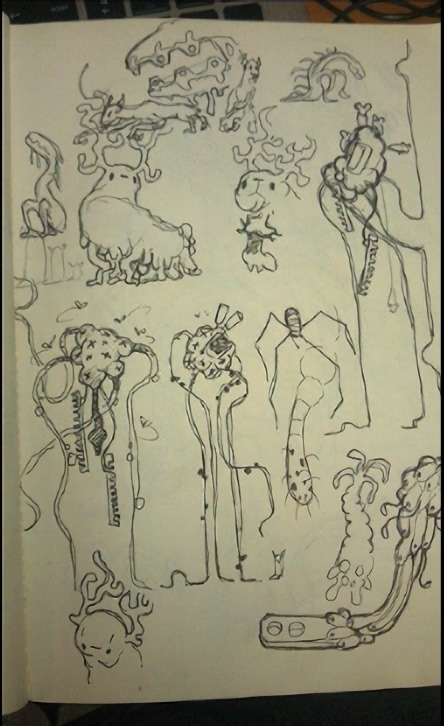
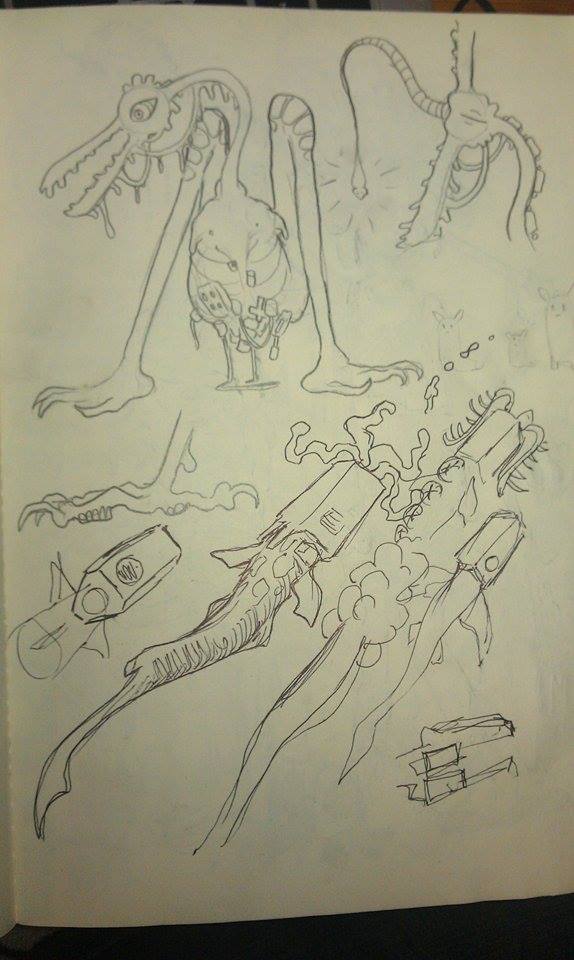
In the concept art, the flesh appears as if it's almost defying the machinery to form an animal shape. It's as if it's conquering its own artificiality the way the foliage grows over the (stone, brick and concrete, not mostly metal as some think!) ruins.
Of course, it's hard to really tell how much of this reflects the finalised concept, most of the integration is much smoother in the game, in line with a seamless kind of biomechanical design. There was always an intention of biomechanical strangeness, as shown in this screenshot of the devlog before the term "slugcat" even existed!
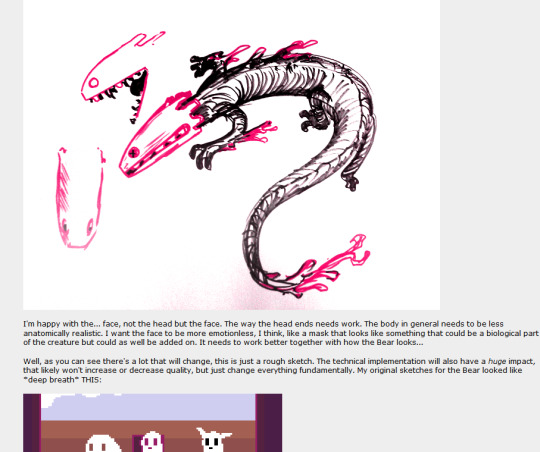
That said, the melty nature of the concept art shows a level of wild change inherent the biomechanical nature of the creatures, as if they truly are the result of these "tubes in boxes" almost revolting against their own boxes.
and considering centipedes... some tubes may not have had boxes in the first place!

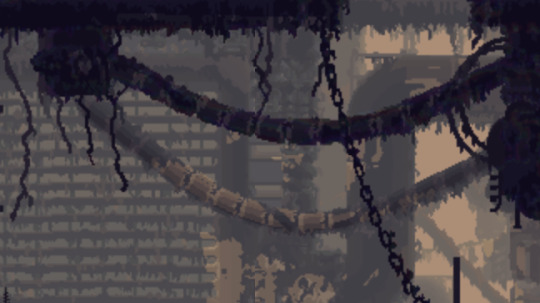

#rain world#rain world lore#rainworld#rw spoilers#please note! my role in downpour development does not make me an authority on what is canon or not!#my domain is entirely within challenge mode and arena which aren't canon anyway#my lore analysis is just lore analysis with no looks behind the scenes of anything vanilla#downpour was made as a fan expansion and the rewrites were just done directly by james#we didn't get any disambiguation on the lore (and thank fuck for that honestly. analysis is the best part)#though the hills ARE made of bricks#this is canon not because i say so but because it is visibly true in some areas of the game. part of the text and thus canon. weep.#i could go into more detail on most of this! purposed organisms aren't my area of expertise tho so i might be a bit shaky on some of that#anyway if anyone has any fact checking to do. please do so#media analysis is a dialogue!
331 notes
·
View notes
Text

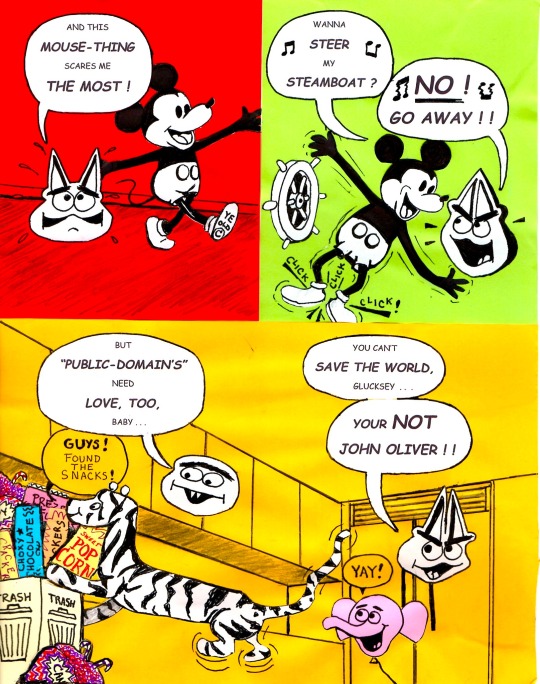



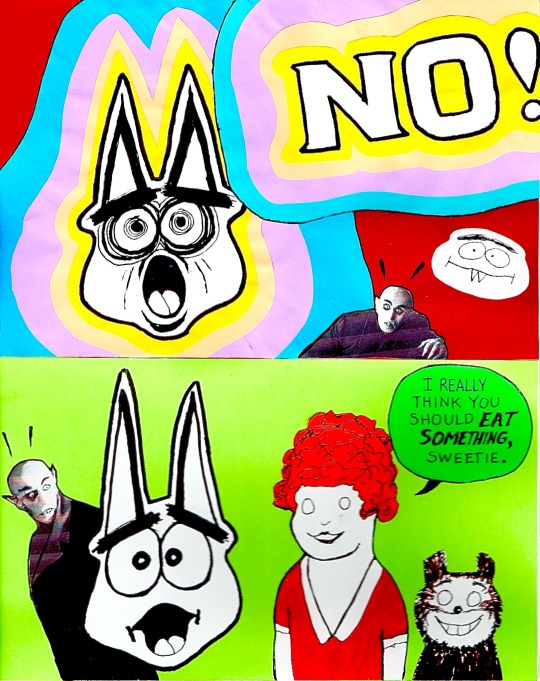

Yup. Another Baby and Glucksey Co-dependent day in Hollywood! Yay! The world of Public Domain is a weird place to navigate. However, there’s a lot of “new-old” stuff to play with as things age out, which allows for some fun, creative moments - other than just “B-grade slasher movies. The sky’s the limit! (Please note: some of these characters are technically still under copyright in the E. U. and elsewhere - due to the different copyright law structure around the world, so, “Fair-Use for Satire” is cited for their specific use in this strip.)
Anyway, much love to you all! Thanks for being such great friends. Your friend, Chrizzzz
#books#literature#inspiration#author#creativity#glucksey#animation#kids#public domain#cartoon#entertainment#hollywood
70 notes
·
View notes
Text
Mickey Mouse will be public domain in 2024. What can you do with him?
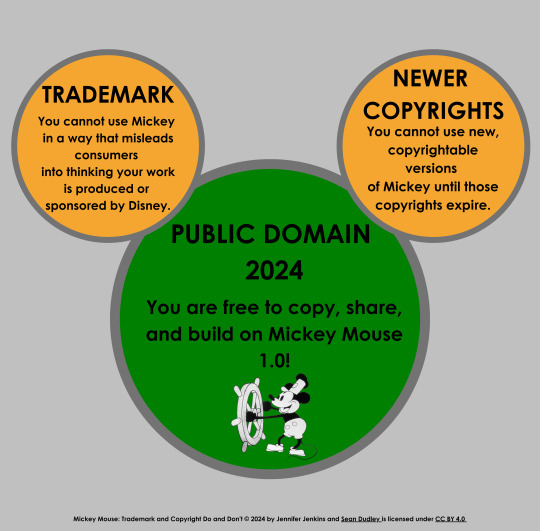
by Jennifer Jenkins, Director, Duke Center for the Study of the Public Domain
On January 1, 2024, after almost a century of copyright protection, Mickey Mouse, or at least a version of Mickey Mouse, will enter the public domain. The first movies in which the iconic mouse appeared – Steamboat Willie and the silent version of Plane Crazy[1] – were made in 1928 and works from that year go into the public domain in the United States on New Year’s Day 2024.[2]
The public domain has had some famous recent arrivals, but this is the most anticipated entry yet. Why? It is not simply that Mickey is a famous copyrighted character. So are Sherlock Holmes and Winnie the Pooh, and while they entered the public domain with some fanfare, it paled in comparison to this event. I’d like to offer a tentative answer. The reason that this event gathers so much attention is that it is the story of a 95-year-old love triangle, a tangled drama that rivals any Disney movie for twists and turns. The protagonists are Mickey, Disney and the Public Domain, and their relationship positively exemplifies the social media weasel-words “it’s complicated.”
READ MORE
132 notes
·
View notes
Text
my personal pipe dream is that one monday the egg statistics drop and flippa (and maybe tilin) are just there. at the end. with one heart, and one gray checkmark.
what i imagine is the server flips their shit. alive!!! alive!!! but they log in and they don't see the eggs. instead they get a message. i do not care who it's from or how it's delivered. they're told the eggs are being held captive somewhere, but they're alive. all that's left is to find them, before sunday at midnight pst. bc if their tasks aren't done, they die (one checkmark, one quest set. once rescued they become triple check like the other eggs)
slimeriana come CRASHING back into the server, they don't know jack shit, ESPECIALLY mariana who doesn't recognize 90% of the island anymore but holy fuck, flippa is alive somewhere and they have to find her. and maybe mariana's still in the old server days mindset of raising his kid alone but slime's slowly been indoctrinated into "it takes a village" and honestly the absolute second mariana logs on, someone's gonna be in chat already like HEY MARIANA CAN I TALK TO YOU? be it baghera or cellbit or forever or bad or I DON'T KNOW, COULD GENUINELY BE ANYONE LMAO but like mystery and eggs in danger is chumming the water for this server
which is great bc A) mariana has a concrete goal for logging into the server (finding his daughter) and B) he would be interacting with the rest of the server along the way, because he's not going to be doing this alone (he wouldn't even be allowed lmfao the rest of the server would be at his doorstep asking to help him in like 15 seconds flat) which means C) he might get reasons to log in extending outside flippa and slime. bingooooo
i call this a pipe dream bc i can poke so many holes in this even rn (does cc!mariana want flippa back, like fr? i'm not up to date) but can you IMAGINE. LIKE DAMN. i'm putting this idea into the public domain fr go nuts with it.
#qsmp#would not mind if that means the revival is a slow burn#(bc of admin team having to prep the mystery and/or adventure)#that would just be a bonus tbh bc it means that the admins would be given more time to fit it into their plans#bc i imagine the story would be harder to alter for the immediate future#but their plans down the line might be more malleable and thus could fit the potentially weeklong mystery into them#this is my pipe dream though i have worms in my brain and they've been screaming flippa since the bug was discovered#i'm not gonna cry in a gutter if it doesn't happen lmfao#qsmp juanaflippa#qsmp elmariana#shut up vic#block game brainrot#submitting this for peer review maybe if i'm lucky the admins will club penguin it#(read: take and run with the idea and pretend that was their plan all along)#either that or a really talented fic author will write and post like three chapters i'll accept that too#✨ this idea is now public domain go hogwild my loves ✨
203 notes
·
View notes
Text

#fanfic authors#fanfic writers#fanfiction#writing#writers#authors#public domain#nintendo#sherlock holmes#dracula
39 notes
·
View notes
Text
not catholic but i do think the concept of patron saints is kinda neat
#i actually read an article for a research paper in cegep where the author compared it to polytheism#bc they all have their own domains and people pray to them for specific problems#soapbox
35 notes
·
View notes
Link
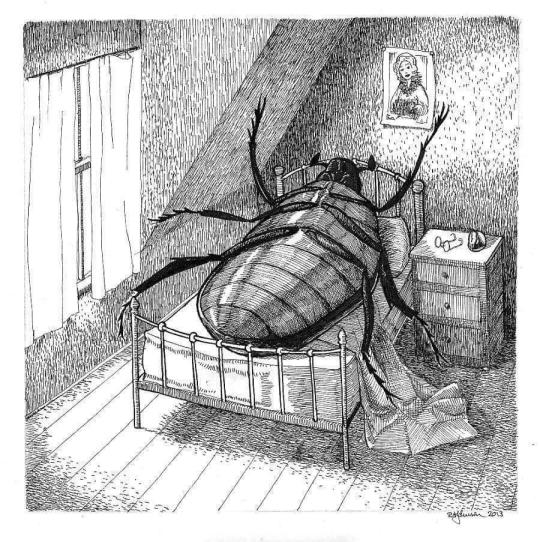
#The Metamorphosis by Franz Kafka#free audiobook#audiobooks#audio#kafka#podcast#podcasts#books#books and literature#books and libraries#books and authors#books and reading#free books#public domain#20th century literature#20th century#literature#The Metamorphosis#1900s
54 notes
·
View notes
Text
re: fics on goodreads convo
i found this shit today on a fic... and just... no.

i would like to inform this person and everyone who agrees with the sentiment that they are awful people. doing this when fic writers have explicitly said do not do this with their fics is just plain rude and disrespectful.
if you must track all of your reading do it in your notes app or create a tracking doc for yourself that isn't public.
#not my fic but like the point stands#fics are not public domain#they belong to the authors so you wanting them on goodreads means absolutely nothing#if the author says no#it means FUCKING NO
51 notes
·
View notes
Text
implement google sitelinks SEO to increase organic traffic,sales
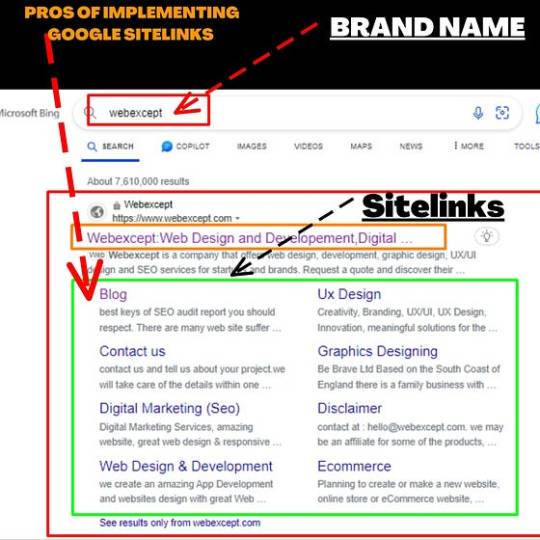
looking for a way to increase organic traffic and boost your business sales without spending money on ads!
this is one of the best and remarkable ways to do it is:
implemnting google sitelinks seach box for your business:
pros:
1-get more clicks(ctr)
2-improve user experience
3-structure your website
4-Increased Visibility
check out our service and let's work together!
https://www.fiverr.com/s/lKxr6y
7 notes
·
View notes
Text
Struggling with My Blog's DA Over Here
In the past year, I’ve managed to raise my DA on GeekMamas.com 6 points, yet here on Momtastic I’ve been stuck at the same number for over a year. This blog is not as old as Geek Mamas, but still, I’d hope to squeak up at least one point in all that time!
What is DA?
Domain Authority, or DA, is a search engine ranking score developed by Moz that predicts how well a website will rank on search…

View On WordPress
8 notes
·
View notes
Text
my headcanon personality for dark crafter when he's not being fricked up and evil and angry is basically just elliott from sdv btw
#he's actually pretty chill he was just lashing out pent up anger in katrc#anger bc he was trying to find a safe place for dark matters and struggled with that#and he wanted to claim seventopia as a domain for dark matters#dark author speaks
9 notes
·
View notes
Note
Write your books so I can wish you a bigolas dickolas!
You can wish me a bigolas dickolas any time at all, friend. But this actually gives me a good opening to reveal that, while attempting to write a short story to take a breather between my giant megaton WIPs, W H O O P S


I Accidentally Wrote a Novella Again
The above ^^^ is me creeping up on the climax of the story, so it may be another handful of pages before the first draft is done-done, but. Yeah. I cannot be trusted to engage in brevity 🤡
But this little*** guy-in-progress seems like an okay stab to take at self-publishing, maybe, so go ahead and Bigolas the Dickolas to sprinkle some preliminary good author luck on it
#I might do a chunk of the Finished draft as a teaser#and then maybe start poking around at physical copies and ebooks and such#and (aughhh) an author site? possibly??#I just want to be able to point at something other than other folks' anthologies I've shown up in as evidence of published works#anyway#my writing#harker horrors#the vampyre#the vampyres#dracula#(yeah big shock I'm still on my classic public domain vampire bullshit)
24 notes
·
View notes
Text
The Empire counters...
#public domain#copyright#bill willingham#authors rights#contract law#intellectual property#comic books
53 notes
·
View notes
Text
think I'm going to start looking into Neocities
#With the Domain Change Tumblr Has I Really Don't Want to Keep This As My Author Site?#That and Also Neocities is Cheaper Than the Domain I Have#I Still Want to Be Here for the Community But I Do Think for An Author Website And for Things I Wanna Do NC Will Be the Better Option#alex has the floor
6 notes
·
View notes
Text
anyway my main verse for lilith will be set prior to the seven-year absence and it will function on the narrative that lilith was plotting & scheming a full-scale revolution against heaven, cutting deals with overlords, facilitating discussion with some of the other noble families, etc. making preparations. whether lucifer is aware of this or no will depend on other writers but by default, the whole plot is kept hush-hush and she doesn't let him know because she presumes he'd be against it.
still figuring out the details of the deal ( and i might wait until canon discloses this info ) but my lilith was not there willingly. she didn't leave him family by choice. toying with the idea of her being there so as to prevent hell from rebelling. hm.
#this is to say: give me political intrigue!!!!!#lilith banging swords together: we're waging war bitches!!#you can't convince me lilith would've been okay with the exterminations.#not even so much about the safety of the sinners but more so... her seeking to topple heaven's authority in her & lucifer's domain.#🥰🥰😘
5 notes
·
View notes